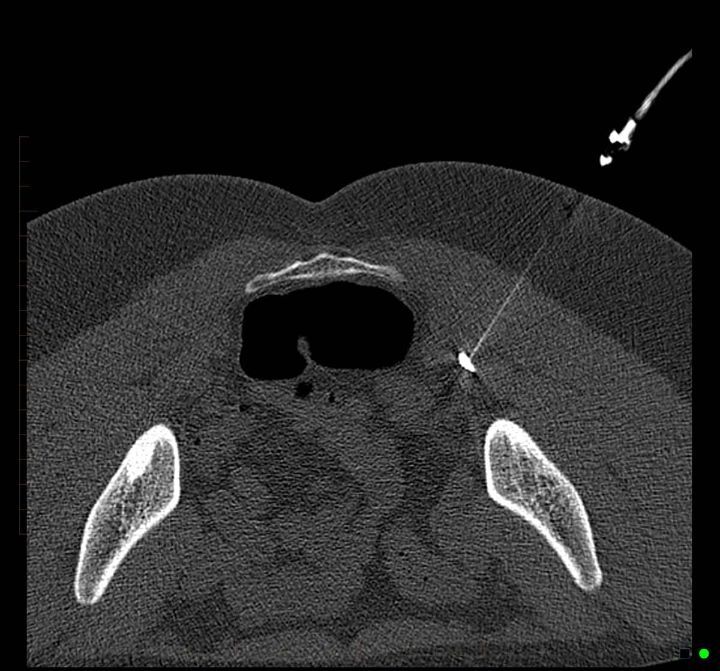Piriformis Muscle Injection.
Piriformis Muscle Injection
Introduction
A piriformis muscle injection (also known as a muscle spasticity injection) is performed in order to treat patients who reports symptoms of sciatica that is felt to be not arising from the lumbar spine. The most common cause of sciatica is due to disc bulges that compress the spinal nerves, however in certain clinical scenarios (for example, in the context where a normal MRI scan shows no compression of the nerves), then the piriformis muscle is often presumed to be the cause of the patient’s symptoms.
As the piriformis muscle lies close to the nerve, spasm, increased size and dysfunctional contraction of the muscle may result in functional/dynamic compression of the nerve. Injecting the muscle with muscle paralysing agents, such as botulinum toxin (though local anaesthetic with/without cortisone is also an alternative [1]), may result in relief of symptoms which is often diagnostic of the condition and is potentially therapeutic. Knowing that the injections bring about relief may also be a good predictor of successful surgical outcome. [2]
Preparation
We also strongly recommend that you bring a responsible person to drive you home afterwards.
***
Important information to tell your doctor prior to treatmentSerious side effects are rare, however if you have an existing condition, this must be discussed with your referring doctor before having treatment. People with local skin or systemic infections are at greater risk of having an infection spreading into the spine after spinal injection treatment. Therefore, if you have a skin infection, which may include wounds, boils or rashes, please tell your doctor or arrange to have the procedure performed at a later date.
RISKS
most of these are minor (1-2%), however can be serious (<0.1%) requiring hospital admission, intravenous antibiotics and surgery.
this is fortunately also rare and slightly common in patients with bleeding disorders and on “blood thinning” medication.
from direct needle trauma, or as a consequence of the above mentioned complications.
which may manifest as fatigue for weeks to several months, as the toxin is a muscle paralysing agent. The risk of this is decreased by injecting contrast to confirm that the needle tip is NOT located within a blood vessel.
Procedure
Piriformis Muscle
Injection
You will be asked to wear a gown with the selected area of the spine exposed. Spinal injection procedures are completed with you lying face down in a CT scanner. We will ensure that you are as comfortable as possible.
A series of planning images are performed, with the area of needle entry planned on the computer terminal and then marked on your skin. The radiologist will then clean your skin with an antiseptic wash and inject local anaesthetic into the injection site. This results in a stinging sensation which is temporary until the skin becomes numb, usually taking 10-30 seconds.
A fine needle is then passed through the skin and tissues, constantly manipulated under CT guidance until it enters the piriformis muscle. A small amount of contrast is injected to confirm that the needle tip is not within a major vessel within the muscle, followed by which the botulinum toxin is gently administered. At this point, most patients report none or minimal discomfort.
CT guided piriformis muscle injection, with contrast injected prior to injection of botulinum toxin pooling in the muscle belly, confirming needle tip not in a blood vessel.
Following your procedure & recovery
At most, you will feel some minor discomfort in the back. As local anaesthetic has been injected into the spine most patients will be pain free.
Patients are asked to stay in the clinic for 15 minutes and thereafter are able to leave. The following day you may return to work and gradually increase your activities. The effects of the injection may take two to four weeks to become evident.
Results &
Follow-Up
One of Melbourne Radiology Clinic’s specialist radiologists, a medical doctor specialising in the interpretation of medical images for the purposes of providing a diagnosis, will then review the images and provide a formal written report. If medically urgent, or you have an appointment immediately after the scan to be seen by your doctor or health care provider, Melbourne Radiology Clinic will have your results ready without delay. Otherwise, the report will be received by your doctor or health care provider within the next 24 hours.
Please ensure that you make a follow up appointment with your referring doctor or health care provider to discuss your results.
Your referring doctor or health care provider is the most appropriate person to explain to you the results of the scans and for this reason, we do not release the results directly to you.
Reminders
References
- Misirlioglu TO, Akgun K, Palamar D, Erden MG, Erbilir T. Piriformis syndrome: comparison of the effectiveness of local anesthetic and corticosteroid injections: a double-blinded, randomized controlled study. Pain Physician 18(2):163-71, 2015
- Ozisik PA1, Toru M, Denk CC, Taskiran OO, Gundogmus B. CT-guided piriformis muscle injection for the treatment of piriformis syndrome. Turk Neurosurg 24(4):471-7. doi: 10.5137/1019-5149.JTN.8038-13., 2014

